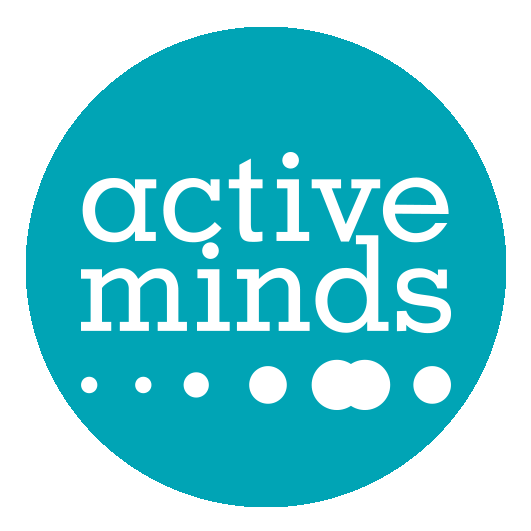
This post is the first in a two-part series on life after Active Minds.
Have you wondered how you can continue to advocate for mental health awareness and suicide prevention post-graduation, even if you don’t plan on making a career out of it? Are you about to graduate and looking to contribute to a workforce that is supportive of mental health? If you answered yes to either of these questions, keep reading!
We interviewed several professionals (who also all happened to be former Active Minds students!) to learn how their experience as a student advocate with Active Minds influenced their ongoing commitment to mental health awareness and suicide prevention. Here are the 5 ways they suggested students can continue mental health advocacy post-college:
Seek out job or volunteer opportunities that allow you to do this work in another context.
Marian Trattner, Suicide Prevention Coordinator at The University of Texas at Austin, recommended, “Find a mental health organization in your community to volunteer with, like the National Alliance for the Mentally Ill (NAMI), or connect with the American Foundation for Suicide Prevention (AFSP) chapter in your area. If there are no organizations like this near you, start one. Be on the board for a non-profit to learn more about it.”
If you prefer directly interacting with people affected by mental health, Ashli Haggard, a project associate for a sexual assault prevention organization, suggested, “Stay involved by volunteering on hotlines, like 7 Cups of Tea, the National Suicide Prevention Lifeline, or the Crisis Text Line.”
Show off the transferrable skills you gained through Active Minds and similar activities on your resume.
Don’t count out the experiences and skills you’ve gained as a student leader on your campus. Maggie Bertram, Associate Director for Training and Education at Active Minds, Inc., shared how her experience as a resident assistant on campus supports her current work.
“The programming piece was helpful. I hosted events that not that many people showed up to, but they took on really important topics. This kind of environment provides a great training ground for future advocates, because anytime you do mental health programs, you have to prepare yourself for the possibility that maybe only three people will show up. Then, you have to think, ‘Well, the three people that are here are getting really good messaging!’”
Haggard shared, “My time as president of the Active Minds Student Advisory Committee and as a chapter board member helped me coordinate large events and projects that involve lots of volunteers and staff. My time as a campus sexual assault peer educator prepared me for the subject matter I currently work with. An internship at a hospital helped me learn about program planning and evaluation in larger communities aside from college campuses. I also held a communications internship at a policy and literacy organization that helped me learn to market programs and develop business skills.”
“No matter what, you will spend the first few months [at a new job] feeling there’s so much to learn. Every experience is new and you’ll learn something on-the-job that you couldn’t have learned beforehand. Even if you don’t have 100% of what a job posting is looking for, what they really want to know is, ‘Can you learn to do this?’ The answer should be, ‘yes!’”
Continue practicing self-care.
Regardless of where you go after graduation, the necessity of practicing self-care is important to remember and can be a form of personal mental health advocacy.
Eliza Lanzillo, who now works at the National Institute of Mental Health, shared, “I try to take time each day to check out and do something just for me. Exercise helps me immensely. I also take time to cook a nice meal for myself and try different recipes every day. I read a fiction novel before going to sleep; it’s nice to get off screens and relax and unwind.”
“One of best things I have done for self-care is to not talk about home at work or work at home; I keep the two completely separate,” said Haggard. “Especially for those working to change some injustice in the world: if you don’t put that down for a second and look at all the good things around you, you’ll burn out. It doesn’t make you a bad advocate to take a break sometimes.”
Bertram recommended writing down your self-care plan and taping it up to your desk or at home. She also discussed the importance of having a strong support network. “My self-care is connecting to and having conversations with my partner to work through difficult emotions. She is really good at helping me put things in perspective and adequately feel and process things.”
Make sure your work environment is healthy and supportive.
You may have to do some digging during job interviews to gauge whether or not the workplace climate is one you want to be a part of. Haggard recommended asking questions about the work environment and the team during job interviews.
“Do people typically work more than 40 hours a week? Do people take their lunch breaks away from their desks? Do coworkers hang out together after work, or do they keep work and play completely separate? What do people say is their favorite thing about working here? Keep in mind that environments that work for someone else may not work for you, and that’s okay.”
Advocate for mental health in your everyday life in simple ways.
There are ways to incorporate mental health into your professional life, no matter where your career path takes you. Hayley Harnicher, Speakers Bureau Coordinator at Active Minds, said, “My former chapter co-president from the University of Rochester is now a fifth-grade teacher and she incorporates mental health into her job. She’ll wear her Active Minds button to class or a yellow ribbon for Suicide Prevention Week and explain to her students what those things mean.”
You can also exercise your policy advocacy rights as a citizen. “Learn about legislative advocacy and go to mental health advocacy day in your area. Get trained in what it means to testify in front of your representatives and senators, or write a letter to your representatives and senators asking [them] to advocate for mental health,” said Trattner.
Haggard added, “You can stay involved by becoming a monthly donor to an organization of your choice as this is a major source of revenue for non-profits and one of easiest ways to support their work. In general, live your life and build your relationships in a mentally healthy and supportive environment. Stay involved in the movement and share it with those you know through simple conversations in your everyday life.”
Interested in taking the next step and making mental health advocacy your career? Keep an eye out for the second post in this series titled, “Life after Active Minds: Pursuing a career as a mental health advocate.”
Interviewee Profiles:
Maggie Bertram, Associate Director of Training and Education at Active Minds (Boston, MA)
Maggie  holds a Bachelor’s degree in history with a focus in secondary education and Asian studies from Illinois Wesleyan University, and a Master’s degree in higher education and student affairs from the University of Connecticut. At Active Minds, she currently manages awareness campaigns, runs online courses for Transform You/Transform Your Campus and Our Stories, Our Strengths, and serves as a
holds a Bachelor’s degree in history with a focus in secondary education and Asian studies from Illinois Wesleyan University, and a Master’s degree in higher education and student affairs from the University of Connecticut. At Active Minds, she currently manages awareness campaigns, runs online courses for Transform You/Transform Your Campus and Our Stories, Our Strengths, and serves as a  trainer for and a member of the Active Minds Speakers Bureau.
trainer for and a member of the Active Minds Speakers Bureau.
Ashli Haggard, Consulting Services Project Associate (Washington, DC)
Ashli has a B.S. in community health from the University of Maryland at College Park. She currently works with a national non-profit organization for sexual assault prevention advocacy.

Hayley Harnicher, Speakers Bureau Coordinator and Internship Manager at Active Minds, Inc. (Washington, DC)
Hayley majored in psychology at the University of Rochester and now manages interns at the Active Minds office and works to bring members of the Speakers Bureau to students all across the country.
Eliza Lanzillo, Post-baccalaureate Intramural Research Training Award (IRTA) at the National Institute of Mental Health (NIMH) (Bethesda, MD)
Eliza earned a B.A. in psychology from Brown University, and now works as an IRTA at NIMH, assisting with clinical research on suicide risk screening instrument development and validation studies.
Marian Trattner, Suicide Prevention Coordinator at The University of Texas  at Austin (Austin, TX)
at Austin (Austin, TX)
Marian holds a Bachelor’s degree in social work and a Master’s degree in social work with an emphasis in policy planning and administration from The University of Missouri (Go, Tigers!). She works in the Counseling and Mental Health Center at The University of Texas at Austin doing community-based suicide prevention programming and outreach.



